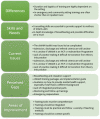Training Packages and Patient Management Tools for Healthcare Staff Working with Small, Nutritionally At-Risk Infants Aged under 6 Months: A Mixed-Methods Study
- PMID: 37761457
- PMCID: PMC10530104
- DOI: 10.3390/children10091496
Training Packages and Patient Management Tools for Healthcare Staff Working with Small, Nutritionally At-Risk Infants Aged under 6 Months: A Mixed-Methods Study
Abstract
Skilled staff are essential for successfully managing child malnutrition, especially when dealing with small, nutritionally at-risk infants aged under 6 months. Training and patient management tools provide healthcare workers with core knowledge, skills, and support. To inform more effective future approaches and support the rollout of new WHO wasting prevention/treatment guidelines, we aimed to map and understand globally available training and patient management tools. In a mixed-methods study, we searched the literature to identify different training packages and management tools and conducted semi-structured key informant interviews with staff working in a variety of internationally organizations and settings. Data were analyzed using a phenomenological approach. We found 14 different training packages targeting different settings, including inpatient, outpatient, and humanitarian contexts. Curricula varied, especially around breastfeeding and maternal assessment, mental health, and nutritional status. Key informants (n = 9) reported gaps regarding counseling skills, time for practice, and how to effectively provide mental health counseling. Training delivery was highly dependent on resources and setting. In conclusion, future training should consider setting-specific needs, opportunities, and limitations. Emphasis on breastfeeding-support skills, mental health support, and counseling skills is needed. Enhanced practical sessions, refresher trainings, and ongoing monitoring and support are vital to ensure sustained high-quality services.
Keywords: MAMI; care pathway; child health; infant; malnutrition; management; nutrition; training; underweight; wasting.
Conflict of interest statement
The authors declare no conflict of interest. The funders had no role in the design of the study; in the collection, analyses, or interpretation of data; in the writing of the manuscript; or in the decision to publish the results.
Figures
References
-
- Kerac M., McGrath M. 14—Management of Acute Malnutrition in Infants under 6 Months of Age. In: Karakochuk C.D., Whitfield K.C., Green T.J., Kraemer K., editors. The Biology of the First 1000 Days. CRC Press; Boca Raton, FL, USA: 2017. pp. 207–220.
-
- Kerac M., James P.T., McGrath M.G., Brennan E., Opondo C., Frison S. Infant malnutrition in low- and middle-income countries: Assessment and prevalence of small and nutritionally at-risk infants aged under 6 months in 54 Demographic & Health Survey datasets. medRxiv. 2021 doi: 10.1101/2021.12.23.21268306. - DOI
-
- WHO WHO Guideline on the Prevention and Management of Wasting and Nutritional Oedema (Acute Malnutrition) in Infants and Children under 5 Year (MAGICapp) 2023. [(accessed on 30 July 2023)]. Available online: https://app.magicapp.org/#/guideline/7330. - PubMed
LinkOut - more resources
Full Text Sources


